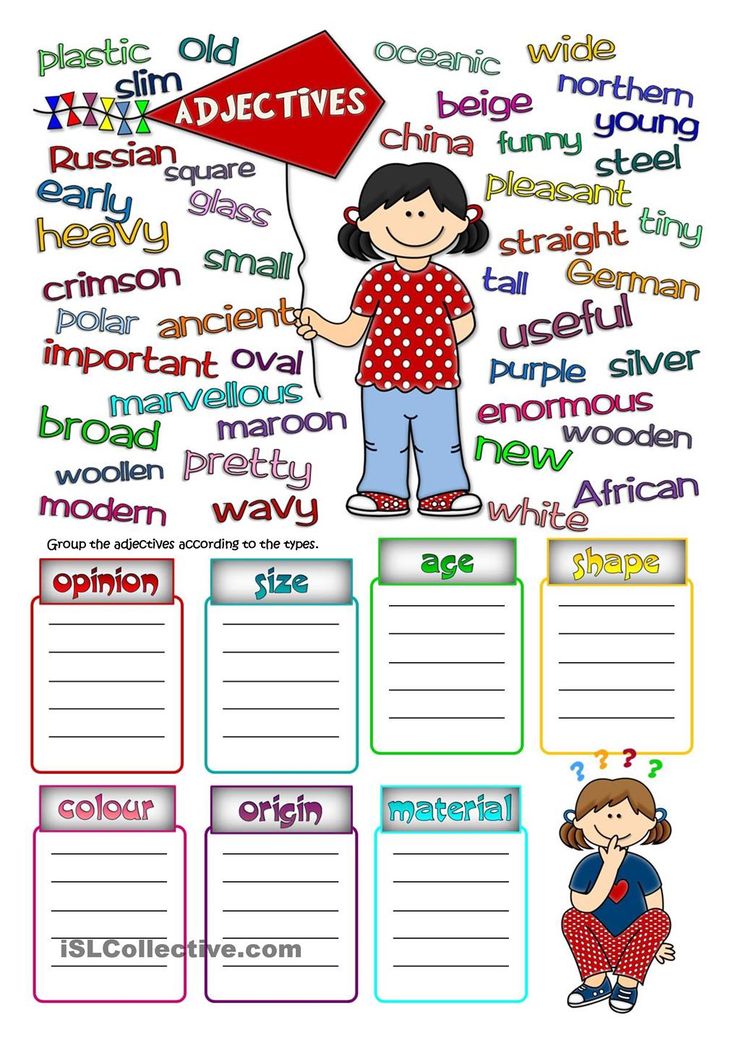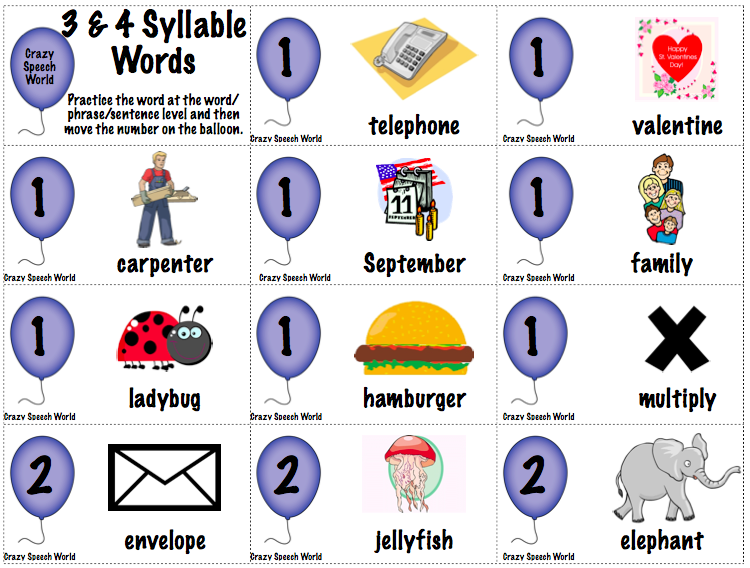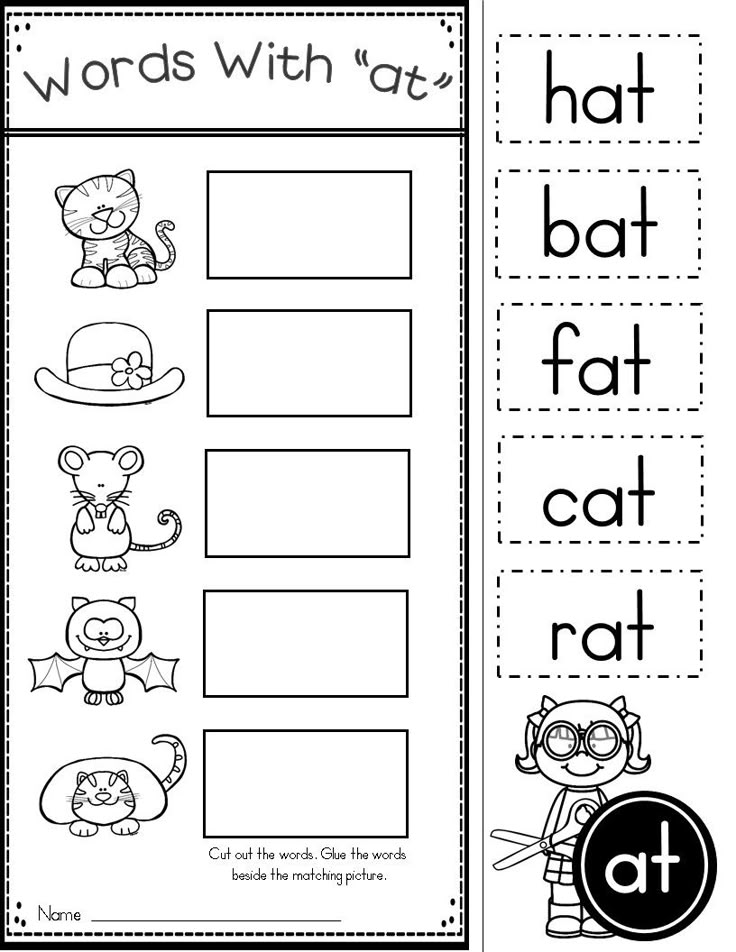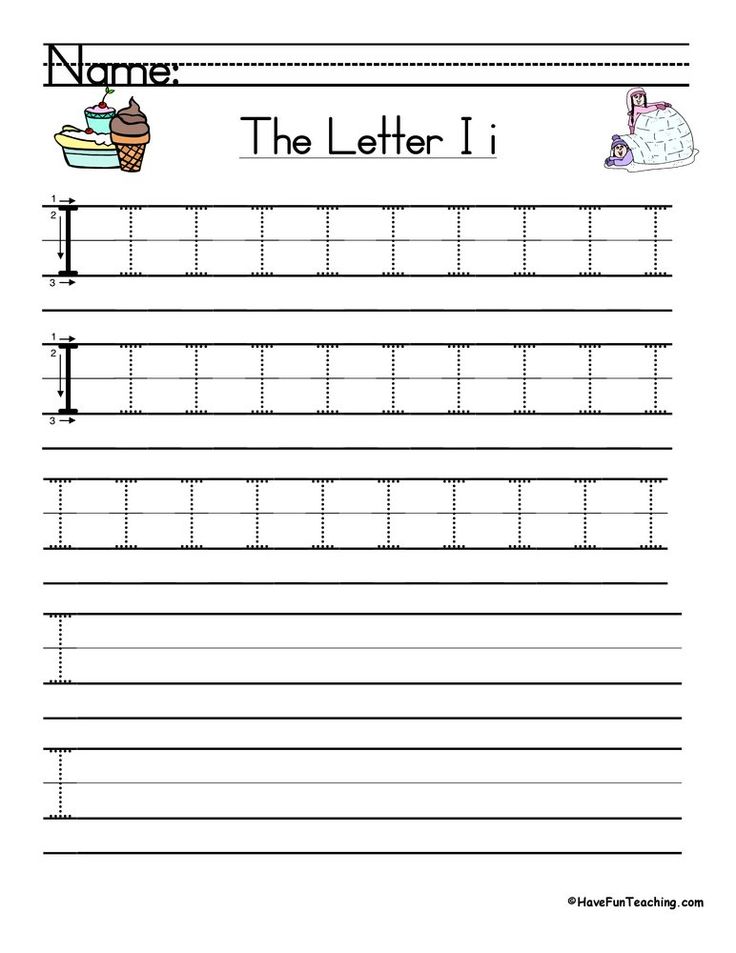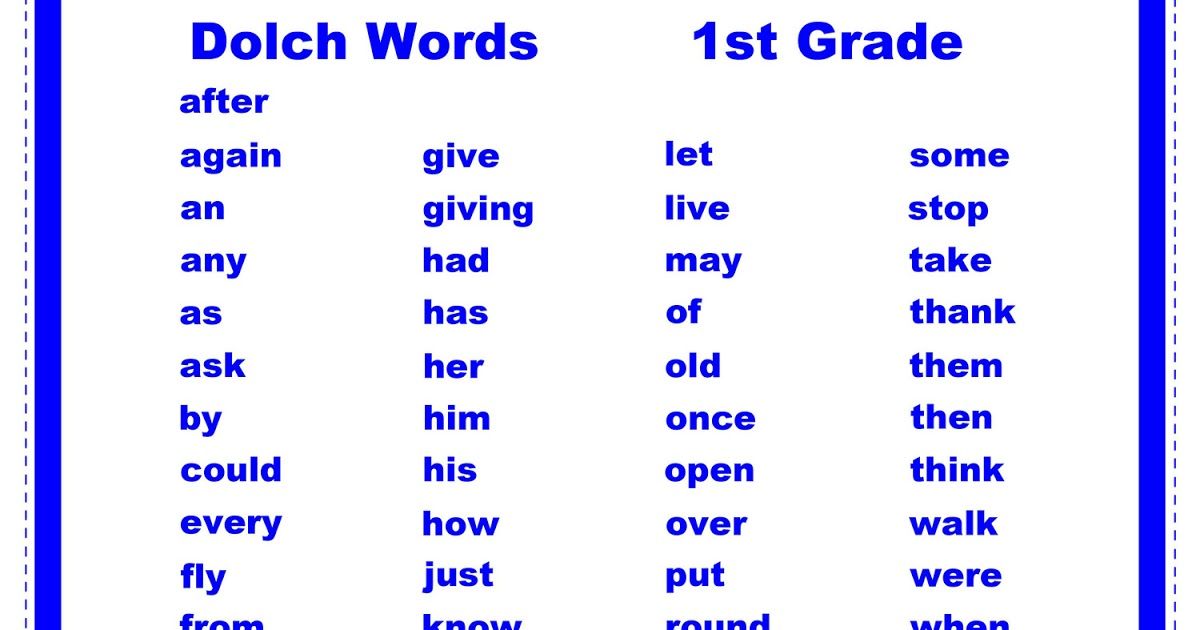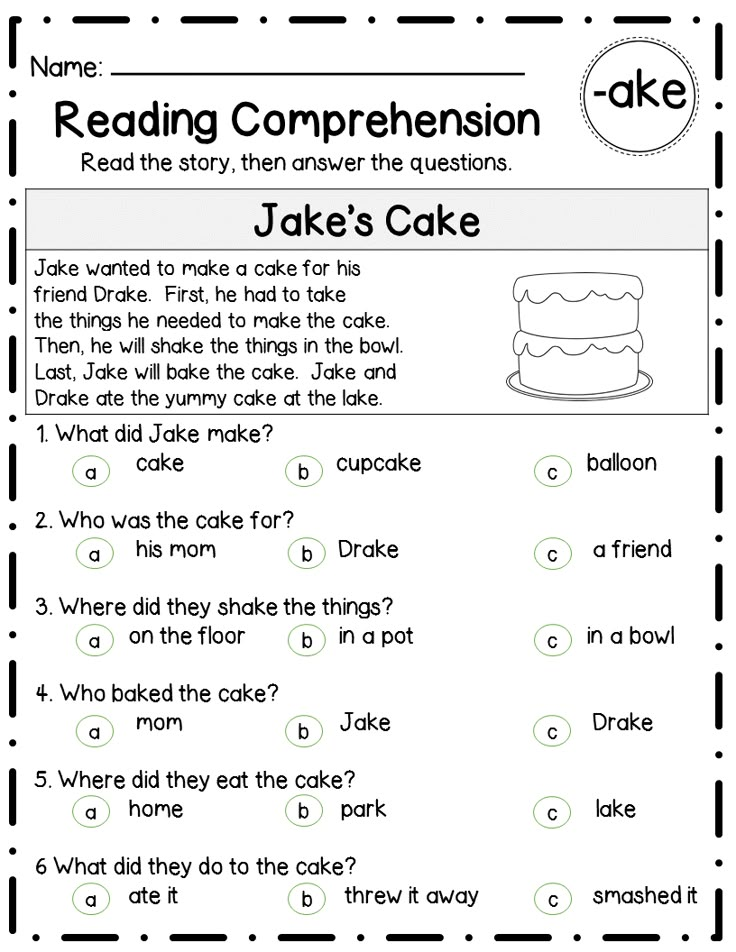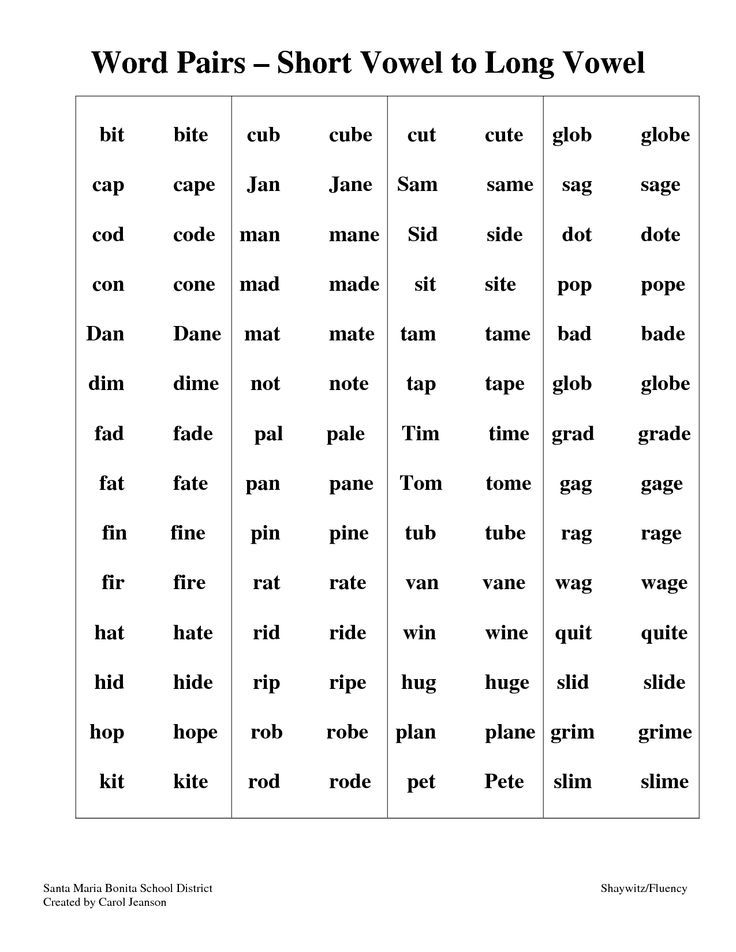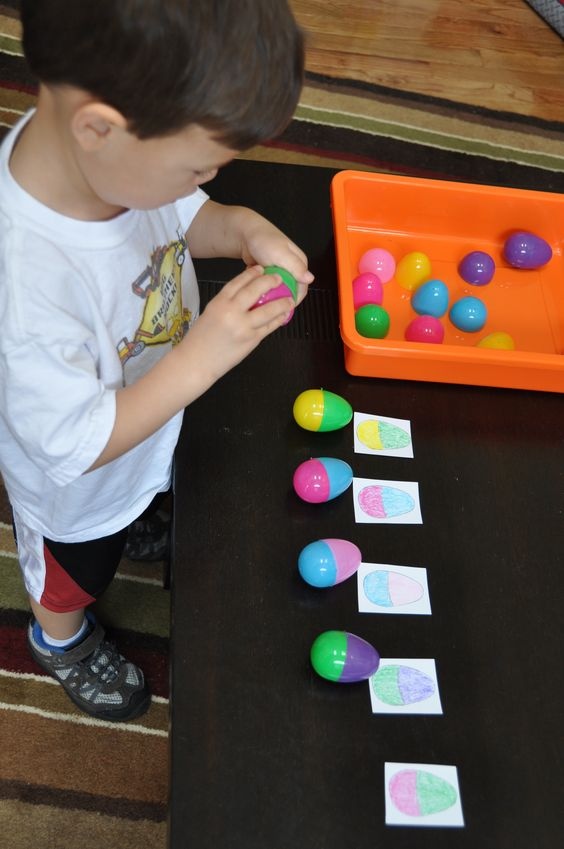Adjective lists for kids
Excellent Adjectives for Kids- A Comprehensive List
Young children start learning about people and their surroundings from an early age, which is why teaching them adjectives is the perfect way to give them a solid foundation from which they can experience the world and build their vocabulary. In addition, by learning how to use descriptive adjectives to describe these experiences, kids start to feel more in control of their own world. The value of adjectives for kids comes from their ability to characterise a noun, giving more detailed and imaginative information about the object of discussion.
By adding the ability to visualise something more clearly, a reader can learn to convey feelings with more emotion and to describe exactly what you want using precise language. Do you want your child to expand their vocabulary by learning age-appropriate adjectives for kids for just 20 minutes every day? Then you should get the KidSmart app. KidSmart is more than just being one of those writing apps for kids, but a tried and tested educational tool geared towards critical thinking and self-learning through games and interactive activities.
Here’s a list of common adjectives for kids that you can start teaching based on their reading and interaction levels:
Contents
- 1 Adjectives for Kids by Grade (US) or Year (UK)
- 1.1 Grade 1
- 1.2 Grade 2 – 3
- 2 Download practice worksheet packs
- 2.1 Grade 4 – 6
- 3 Classifying Adjectives: Grammar for Kids
- 4 How KidSmart Can Help Writing for Kids
- 5 Download Practice Packs
- 6 More Reading
Adjectives for Kids by Grade (US) or Year (UK)
Grade
1The following list of describing words are commonly used.
Colours: blue, green, purple, orange, black, white, pink, red, yellow
Size: big, small, short, tall, fat, thin
Sounds: loud, quiet
Shapes: round, square, oval, triangular
Numbers: one, two, few, many
Touch/Texture: rough, smooth, soft, hard
Weather: sunny, rainy, windy, dark, light, cloudy
Grade
2 – 3Alphabetising the common adjectives for kids can help them learn the describing words and their respective meanings more quickly and organise their learning process.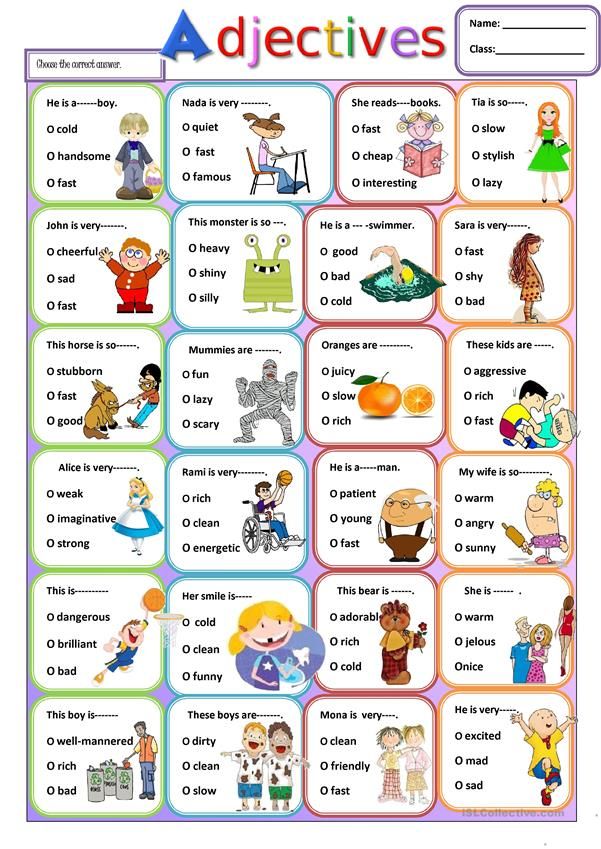 This will also allow them to find adjectives that start with a specific letter more conveniently and explore other options more easily.
This will also allow them to find adjectives that start with a specific letter more conveniently and explore other options more easily.
Letters A-C: angry, bumpy, busy, brave, crispy, cruel, cheerful, chilly
Letters D-H: dangerous, deep, dirty, dry, empty, equal, easy freezing, funny, fat, fluffy, furry, fuzzy, huge
Letters I-N: itchy, icy, juicy, kind, lazy, long, lumpy, left, large, mean, messy, naughty, new, nice
Letters O-R: oily, old, plump, pretty, proud, quick, ready, ripe, right
Letters S-Z: short, simple, slimy, sloppy, slow, spiky, spoiled, sticky, stiff, still, stinky, strong, swollen, thin, tiny, tricky, ugly, weak, wise, wrong, wet
Download practice worksheet packs
Download Adjectives for Grade 3 Kids Pack 1
Grade
4 – 6Letters A-C: able, adventurous, absurd, apologetic, aware, alert, amusing, ancient, annoyed, anxious, bitter, brilliant, bashful, beautiful, bulky, capable, cautious, creative, creepy, cruel, curly, challenging, charming, clever, compassionate, cosy, cranky
You can learn many more adjectives for kids that start with a or start with b.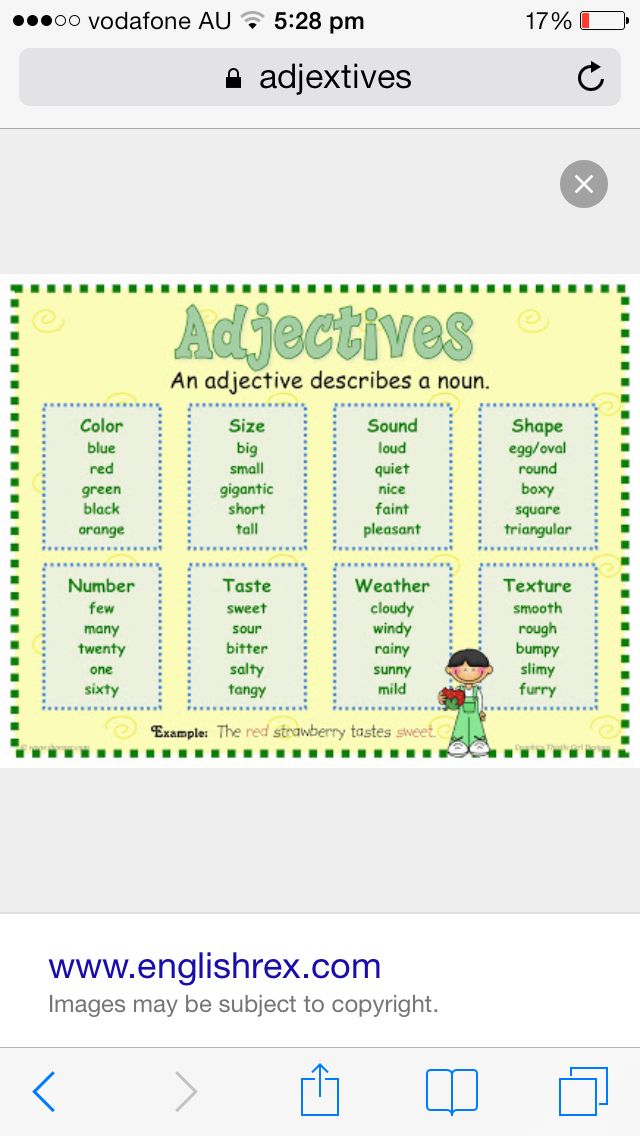
Letters D – H: damp, daring, delicate, delicious, disrespectful, dreadful, dull, ecstatic, endless, enormous, entertaining, exhausted, fantastic, foolish, frightened, furious, fussy, gentle, gigantic, gorgeous, graceful
Take a deep dive into many more adjectives that begin with e.
Letters I – N: innocent, icky, intelligent, infinite, jaded, joyful, jolly, jumpy, kind-hearted, kindly, knowledgeable, likely, lousy, loyal, lucky, marvellous, naive, nervous, nimble
Familiarise yourself with many excellent adjectives for kids that start with j, with m and with n.
Letters O – S: optimistic, oval, petite, pleasant, polite, precise, prickly, salty, shocking, slick, slippery, sour, sparkling, straight, stubborn, stunning
Jump to the list of excellent adjectives for kids that start with r and that start with s.
Letters T – Z: temporary, terrified, timid, tricky, truthful, whimsical, young, yummy
Classifying Adjectives: Grammar for KidsThere are different kinds of descriptive adjectives in the English language, all of which will at some point or the other be a solid stepping stone towards improving grammar for kids as they get older and advance through the school system.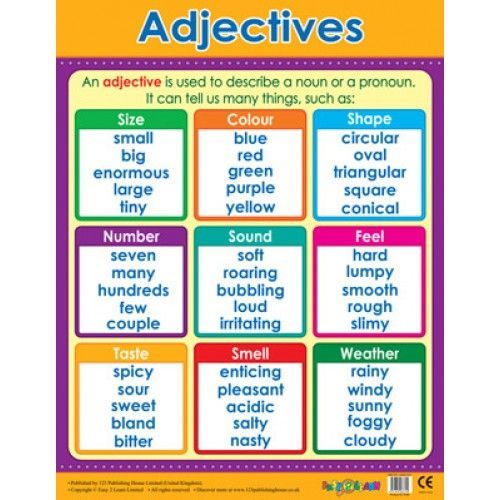 After organising the words in alphabetical order, these descriptive adjectives have been further sorted into categories for greater understanding and can be quite useful when preparing for promotional exams, such as the CEM and 11+.
After organising the words in alphabetical order, these descriptive adjectives have been further sorted into categories for greater understanding and can be quite useful when preparing for promotional exams, such as the CEM and 11+.
Proper Adjectives
These adjectives are derived from proper nouns and are used to describe something in terms of culture, nationality, or religious affiliation.
Some examples of proper adjectives include: African, Asian, British, French, Japanese, Latino, American, Australian, Catholic, Lutheran, Jewish
Food Adjectives
There are many words that can be used to conjure tasteful images when discussing food choices. With the proper adjective definition for kids, they can understand the difference between a “ tasty, cheesy, homemade, spaghetti with meatballs” and a “regular mass-produced fast food pasta,” Some examples include:
Sweets: sugary, chocolatey, syrupy, minty,
Fruits: ripe, sour, juicy, tart, acidic
Dairy: Cheesy, buttery, creamy
Beef: Chewy, peppery, spicy, marinated, lean, dry
Cereal: crunchy, soggy, flakey, nutty
Adjectives for Describing a Person
There are many terms that can be used to describe people in terms of their physical appearance and personality traits.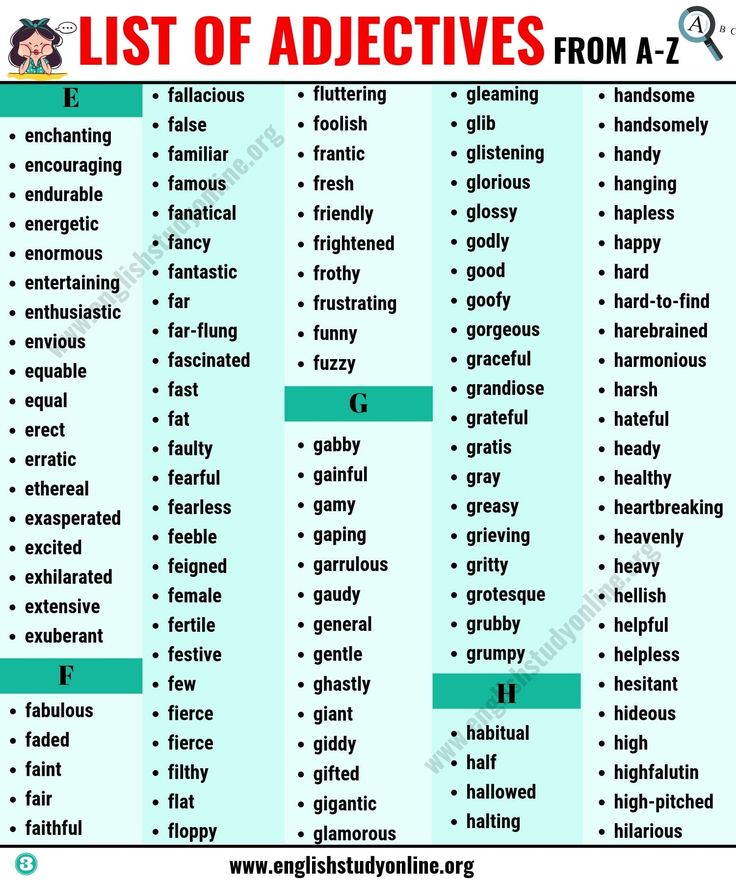 It is important for your child to have these words in their written and spoken vocabulary because as they grow older, they will at some point, face a situation that requires them to describe someone. Some examples include:
It is important for your child to have these words in their written and spoken vocabulary because as they grow older, they will at some point, face a situation that requires them to describe someone. Some examples include:
Characteristics and Traits: clever, creative, kind, generous, considerate, flexible, mysterious
Personality traits: calm, humble, arrogant, proud, charismatic, mean
Physical Appearance: straight hair, cropped hair, blonde, brunette, lanky, dwarfish, plump, skinny
Learn many more adjectives to describe a person.
Happy Adjectives
These words are great for describing jubilant situations, helping children create strong descriptions for a party or celebration scenes like their last birthday or playdate.
Examples include: beaming, joyous, blissful, joyful, delightful, pleased, cheerful, jovial, jolly, glad, thrilled, elated, gleeful, sunny
Peaceful Adjectives
These words are used to describe a state of serenity.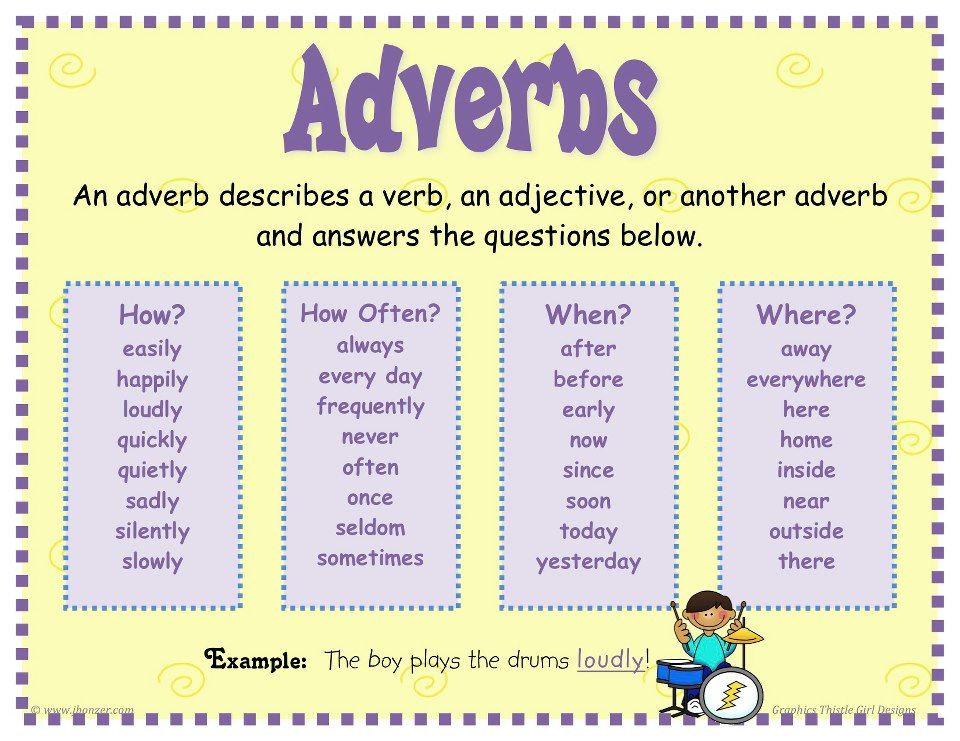 Some examples include: serene, calm, harmonious, peaceful, nonviolent, quiet, undisturbed, still, soothing, tranquil, relaxing, restful
Some examples include: serene, calm, harmonious, peaceful, nonviolent, quiet, undisturbed, still, soothing, tranquil, relaxing, restful
Sporty Adjectives
Many school curricula include a variety of sporting events as part of their physical education activities, so your children have most likely come across these types of adjectives.
Examples include: accurate, active, agile, athletic, frenetic, skilful, speedy, swift, slick,
Adjectives to Describe a Place
These descriptive words can serve as a springboard for the new territory that your child visits or reads about. By learning the right adjectives to describe a location, they become even more interested in learning more about the world outside of their immediate surroundings.
Some examples include: gigantic, grassy, exotic near, far, tidy, spacious, spooky, smelly, lively
How KidSmart Can Help Writing for KidsBecause descriptive adjectives are so common in everyday conversations and learning materials, learning more about them is vital to creating and speaking grammatically correct sentences.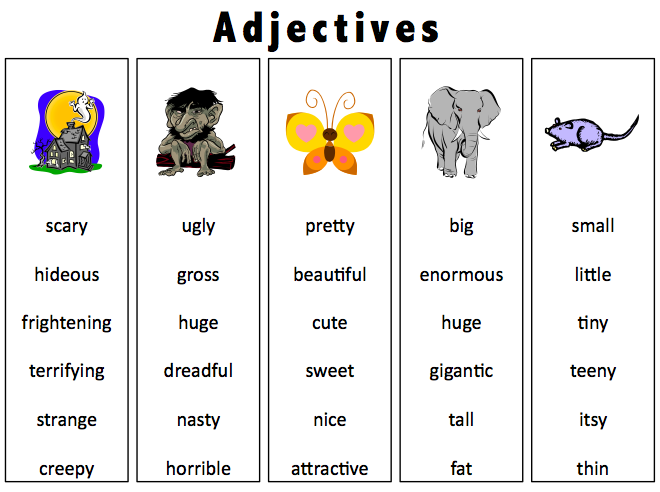 KidSmart can help achieve this through its array of gamification strategies and activities that are designed for
KidSmart can help achieve this through its array of gamification strategies and activities that are designed for
- Progressive Grammar – The app follows progressive development methodology and introduces new concepts based on the level of understanding specific to your child.
- Spelling – Since KidSmart is geared towards the UK curriculum, it presents words that are relevant for the child’s year and tests them multiple times to assess their confidence level. It then adjusts the difficulty level automatically based on the responses.
- Vocabulary Building – As your kids progress, new words are introduced with meaning and usage examples. They also have access to the Oxford Dictionary at any time.
Download Practice Packs
Download Adjectives for Grade 3 Kids Pack 1
More Reading
Adjectives with S
What’s an adjective?
BBC: What are adjectives for year 2-3?
A Helpful Guide And List
While introducing your child to various language concepts, you might ask yourself why adjectives for kids are so important.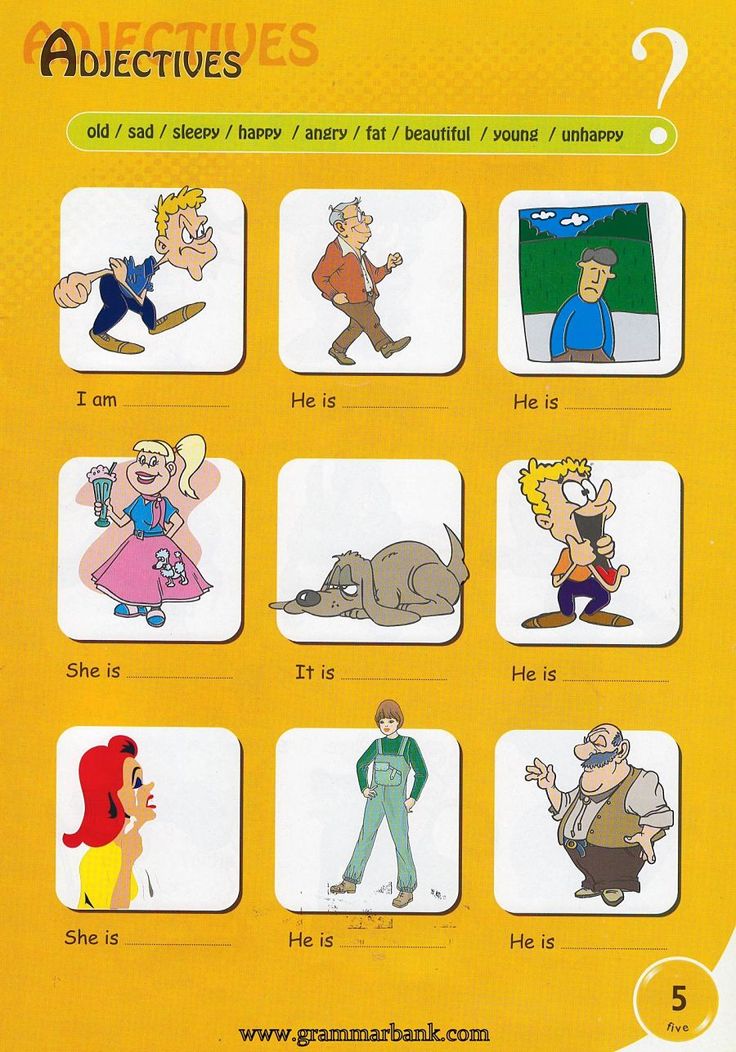
Words like “beautiful,” “fast,” “happy,” and “messy” are common adjectives your child might already know. But what makes them essential for language development? To answer this question, we must understand what role adjectives play.
Adjectives are words that add flavor to our sentences. They help make sentences more meaningful, they help us express the different qualities of an object or person, and, without them, our speech would be bland and boring.
In fact, adjectives are so important that children start using them from early in their language development (think “that’s good” and “that’s bad” and “I am sad…or happy”) and continue to expand on their understanding of them for years to come.
If you want to help your child make a richer use of adjectives in their talking and later their writing but don’t know where to begin, you’ve come to the right place. Our HOMER learning experts know a thing or two about teaching kids adjectives.
In this comprehensive guide, we’ll take you through all you need to know about adjectives and some of the most effective strategies for helping your child understand them.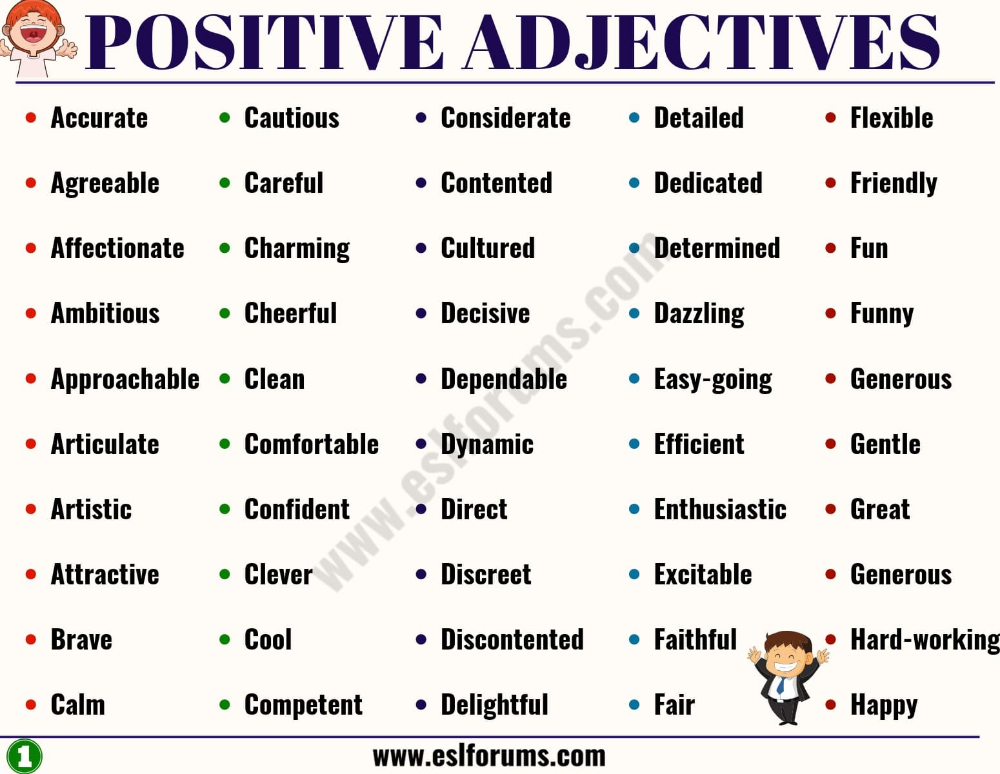
What Are Adjectives?
What are some words you would use to describe yourself? Are you tall, short, funny, smart, or fast? These words are all adjectives.
However, adjectives don’t just describe people. They also help us describe animals, objects, and thoughts. In addition, we can express what something feels like to taste, touch, or smell because of adjectives.
By learning these types of words, children can create vivid images of what they are describing and give distinctions and comparisons. This is beneficial for building vocabulary and helping children clearly express their thoughts and feelings.
When Should Kids Learn About Adjectives?
Children’s use of adjectives changes over different stages of their language development. Here’s a closer look at what you can expect during early childhood.
2 – 3 Years
By the time a child reaches the toddler stage, their language skills have developed at an incredible rate. Children at this stage understand simple adjectives, like:
- Small
- Big
- Messy
- Soft
- Sticky
- Tiny
4 – 6 Years
When a child enters preschool and then kindergarten, they will continue developing their vocabulary as they interact with other kids and their teachers and are exposed to more books.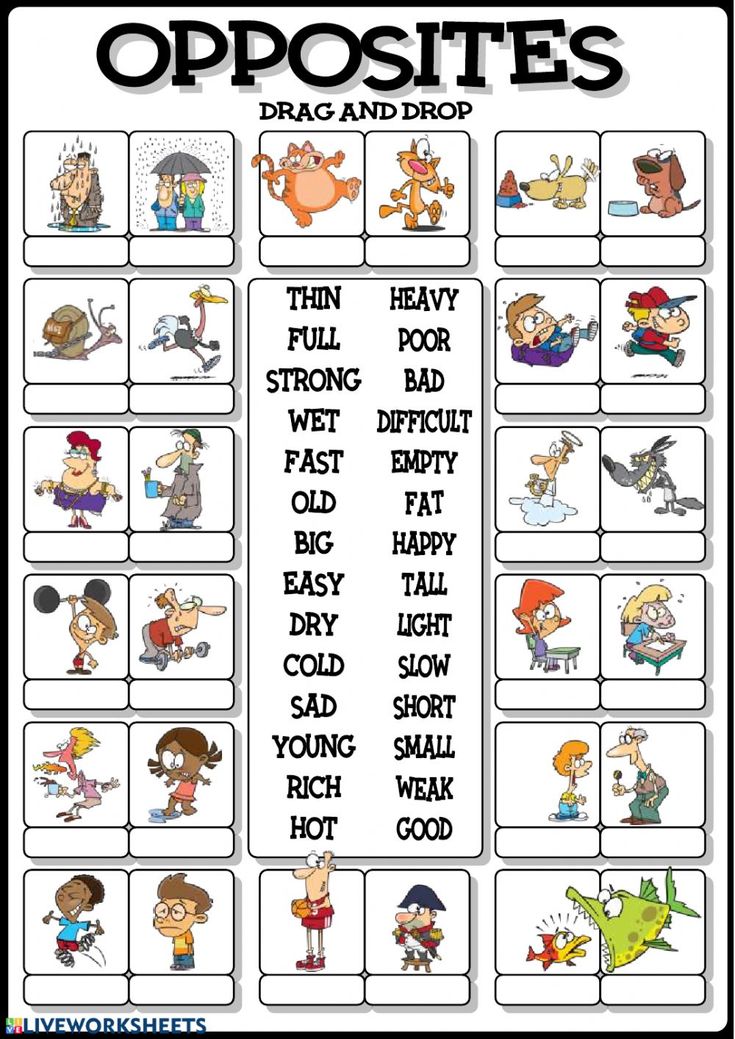
A significant part of their vocabulary will include adjectives. At this stage, children are likely to understand more descriptive adjectives, like:
- Scratchy
- Gentle
- Polite
- Shocking
- Terrified
- Clever
- Damp
- Impossible
- Interesting
It’s important to note that there is no wrong or right time for children to start learning about adjectives.
Since these words form a part of our everyday vocabulary, as your child starts speaking, they will naturally pick up on them and start using them in their own speech.
When it comes to adjectives for kids, they may not always understand what each word means. That’s why it’s important to help your child not only know these words but also understand their meanings so they can use them appropriately.
How To Practice Adjectives For Kids
Helping your child improve their understanding of adjectives doesn’t have to be boring! Here are a few fun activities you can try at home.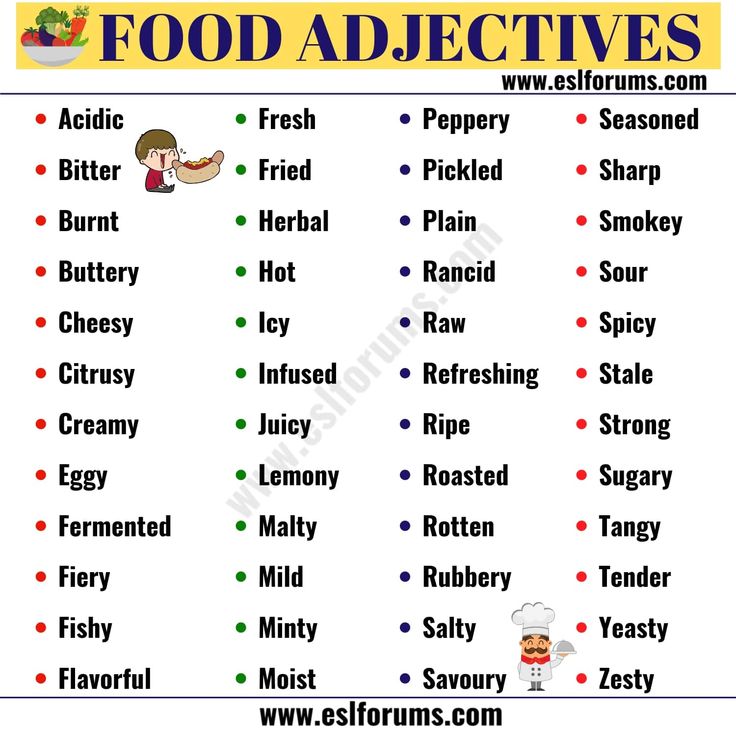
1) Play Adjectives Charades
This is a fun activity that gets the whole family involved. Simply write adjectives on separate pieces of paper and take turns choosing a piece of paper and acting out the word on it.
If you have very young children, remember to use simple adjectives — weak, strong, nice, mean, angry, etc. And for children who haven’t yet learned how to read, you can read the words for them as needed.
Acting out adjectives is one of the best ways to help your child understand and remember the meaning of the words.
2) Describe A Person, Place, Or Thing
Since adjectives help us describe a person, place, or thing, why not create an activity centered around this concept?
To get started, make a list of six categories of nouns you can describe with an adjective. For example, your categories can include a person, tree, cat or dog, couch, ice cream, and music.
Once you have your categories, it’s time to roll your dice. The concept is simple — the number you roll will match a category, and you will need to come up with adjectives to describe that person, place, or thing.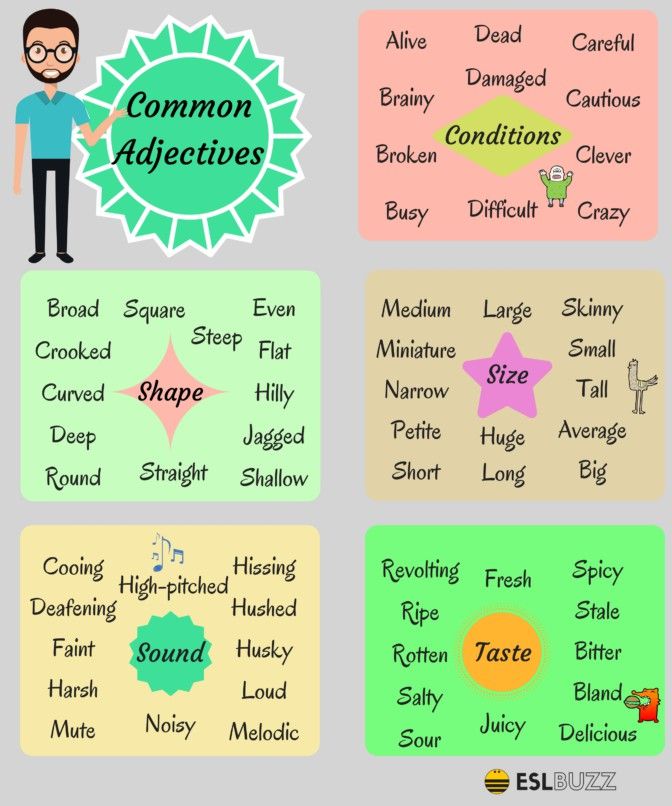
For instance, if you roll a four and your fourth category is “couch,” you will need to come up with words to describe a couch (comfy, big, soft, etc.).
With younger children, you might come up with a single adjective, but as children’s vocabulary grows, you can make the game aim higher — up to six adjectives for each noun.
To make it more interesting for older kids, you can give them 30 seconds to come up with the adjectives. Each word earns them one point, and the adult would need to get twice as many points as the child to win the game.
3) Have Fun With Adjectives In Your Speech
Sometimes you don’t need to create complicated games to practice adjectives for kids. Since adjectives are a part of our everyday vocabulary, you can easily create moments throughout the day when you intentionally use descriptive words in conversation.
For example, instead of saying, “Have some strawberries,” you might say, “Have some juicy, bright-red strawberries.”
Or, instead of saying, “Cuddle in your blanket,” it’s more effective to say, “Cuddle in your soft, cozy, fluffy blanket.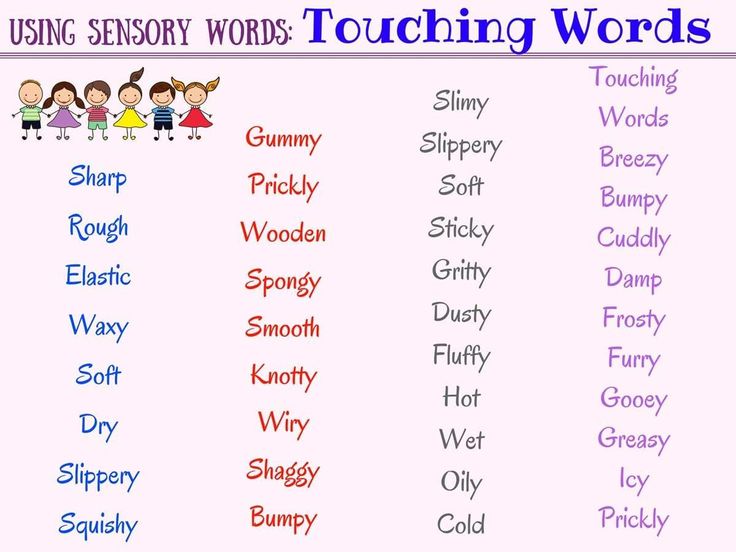 ”
”
This simple activity can help your child significantly improve their vocabulary as well.
4) Play The Adjective Switch Game
Another fun way to help your child practice adjectives is by playing the adjective switch game.
For this activity, name an animal — a bear, for example — and then use an adjective to describe it. Your child would then act out the adjectives.
For example, you could say:
- Hungry bear
- Unhappy bear
- Angry bear
- Silly bear
- Sleepy bear
To make the game even more fun, you might go really fast from one adjective to the other as your child tries to keep up.
You can then turn the tables and let your child have a chance while you act out the adjectives they use to describe the bear.
List Of Adjectives For Kids
Now that you have a few fun activities to help your child continue practicing adjectives, you probably want to get started creating these right away.
But which adjectives can you include? Here’s a list of relevant describing words you can add to games.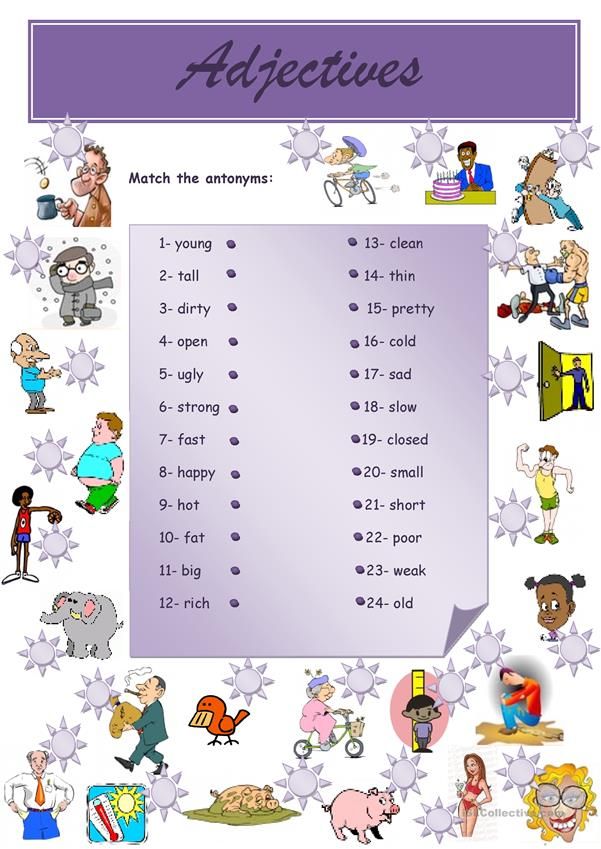 (Remember: Some of these may be challenging for younger children. Choose adjectives based on your child.)
(Remember: Some of these may be challenging for younger children. Choose adjectives based on your child.)
Colors
- Bright
- Beaming
- Bold
- Dark
- Radiant
- Colorful
- Glistening
- Glowing
- Radiant
- Vibrant
Numbers
- One
- All
- Many
- Every
- First
- Second
- Third
- Double
- Few
- Each
Shapes
- Curvy
- Straight
- Circular
- Triangular
- Flat
- Hollow
- Deep
- Square
- Narrow
- Sizes
- Big
- Average
- Buff
- Tall
- Short
- Petite
- Skinny
- Slim
- Fit
- Broad
Emotions
- Angry
- Furious
- Upset
- Disappointed
- Content
- Joyful
- Frustrated
- Exhausted
- Cranky
- Jolly
Weather
- Sunny
- Cloudy
- Wet
- Dry
- Foggy
- Humid
- Windy
- Clear
- Breezy
- Rainy
Textures
- Smooth
- Rough
- Soft
- Furry
- Bumpy
- Coarse
- Dry
- Fleecy
- Hairy
- Mushy
Since there are so many adjectives in the English language, it’s essential to take your time introducing your child to them.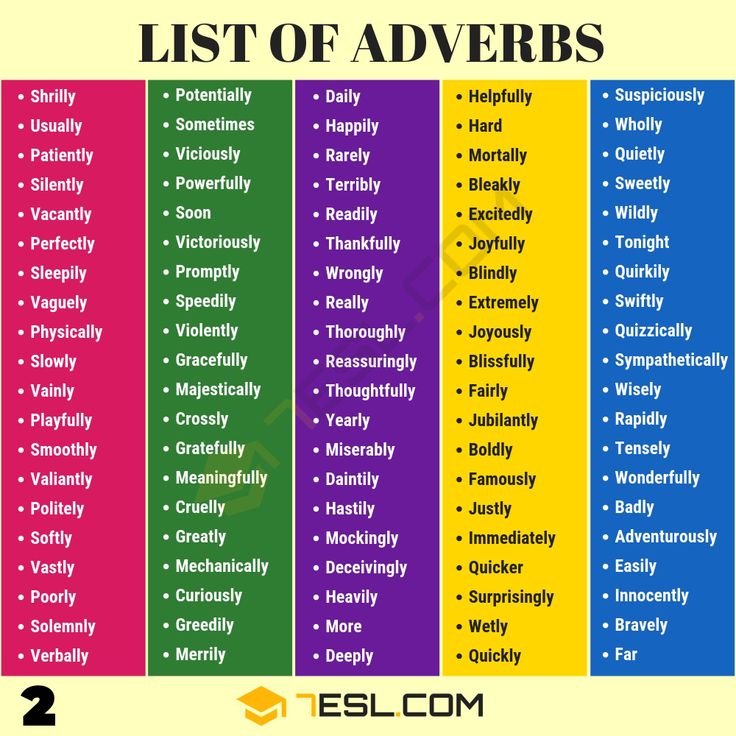
It’s also important to note that simply expanding your child’s vocabulary bank shouldn’t be the focal point. While it can be great to hear your child reciting the many words they’ve learned, a problem may arise when they know the words themselves but don’t understand their meanings.
Instead, as you introduce adjectives to your child, focus on helping them understand the words. An improvement in your child’s vocabulary will be a natural byproduct of that.
It’s Time To Describe!
Adjectives are words that help us describe people, places, or things. Without them, it would be difficult to distinguish between a red and green apple or a stormy and sunny day. This is why we’re passionate about adjectives for kids!
As much as we may use these describing words in our everyday language, it’s not always so simple to help our children understand them. But with the right plan, it’s definitely possible, and the above activities can help you introduce adjectives for kids in a fun and engaging way.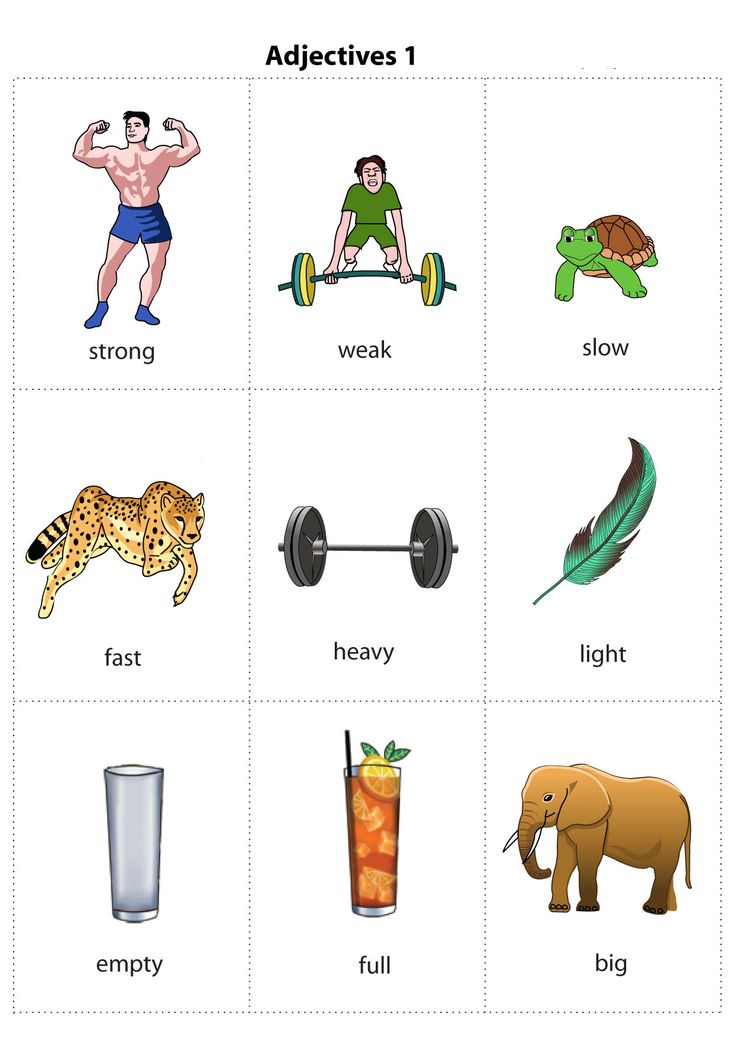
Whether you choose to act things out, be extra descriptive in your everyday language, create a fun word game, or all the above, remember to focus on helping your child understand the meaning behind the words.
Language development is a significant part of early childhood education. Check out the HOMER Learn & Grow app for more information on how to help your child thrive!
Author
Adjectives characterizing a person from the good side
Heading: For every dayHere is the most complete list of adjectives that positively characterize a person. The list does not include obscene words and words that are professional terms used by a narrow circle of people for professional purposes (not in colloquial speech).
The list does not include such words as: “beautiful”, “blue-eyed”, “stately”, “slender” and the like. They describe appearance, but (although they are adjectives used to describe a person) they are not related to character and are unable to shed light on personality traits.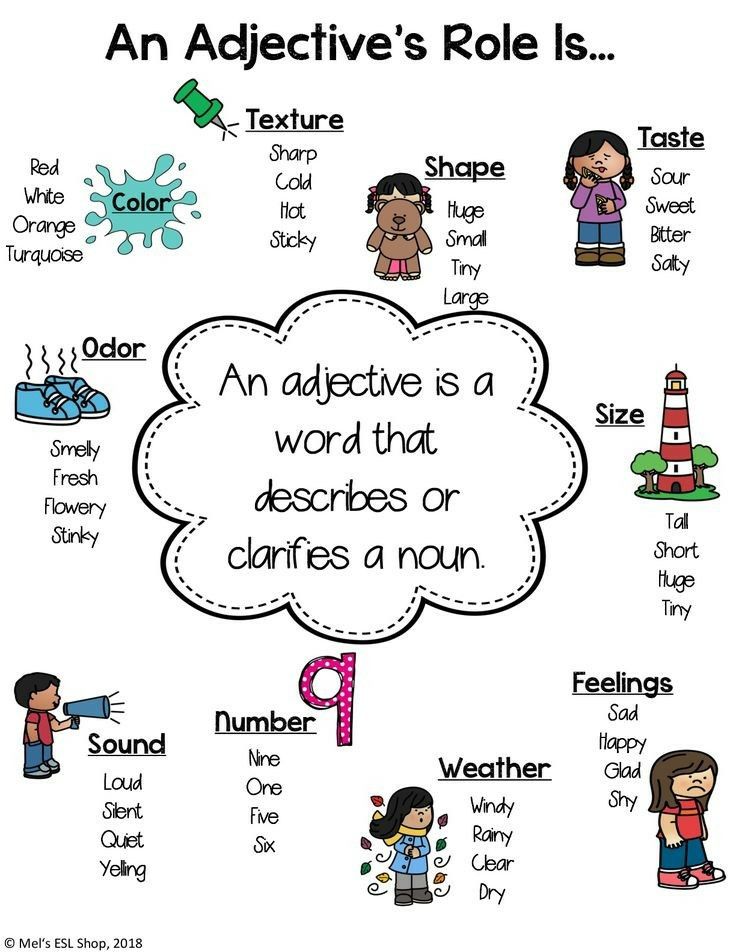
Please note: the list contains words that can be both an adjective and participle (depending on the context in which the word is used at any given time).
Also, remember that some words are neutral in color and characterize a person from the good side only depending on the context in which it is used. But in the same way, it can be used not as a characteristic of positive personality traits, but simply as a statement of fact (without a specific coloring).
If you need the most complete list of adjectives that characterize a person (both positively and negatively), you can find it at the link above.
A
- Adventurous (positively characterizes if used in a good way)
- Adequate
- Gambling (here in the meaning - a positively gambling person, for example - an athlete or passionate about study, work, i.e. - very enthusiastic)
- Active
- Neat
- Altruistic (altruistic)
- Ambitious (if positively ambitious, in a good sense, we are talking about healthy ambitions of an adequate person)
- Apolitical
- Ascetic without violating the rights of others)
- Artistic
- Aristocratic
B
- Alert
- Harmless
- Fearless
g
- Galant
- harmonious
- Brilline
- Heroic
- Thunder
- Deep (here is not empty, filled person)
- Talking
- Golovasty 9001
- Hot (if used positively)
- Hospitable
- Literate
- Humane
- Gutta-percha
D
- Forethly
- Darovite
- Delicate
- VELE
- Business
- Democratic
- Daring (sometimes insolence is required for the implementation of bold plans and this personality quality becomes positive)
- limy (cm above.
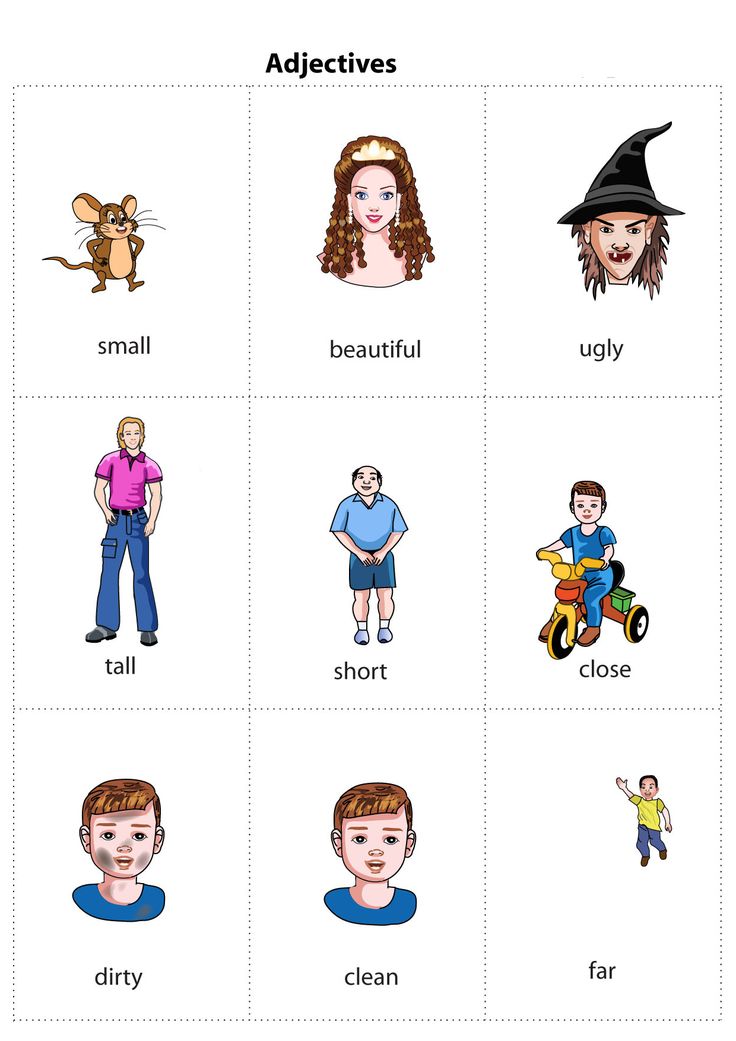 as daring)
as daring) - Active
- Diplomatic
- Disciplined
- Valiant
- Kind
- Kindest
- Companion
- Social
- Comfortable (for example: Comfortable in communication, in solving disputed issues, etc.)
- specific
- competitive
- Conservative
- Creative Creative Creative Creative Creative
- Painstaking
- Meek
- Cultural
L
- Laconic
- Gentle
- Light (here, not light by weight. For example: easy to communicate, easy to get on with, etc.)
- Lyrical (neutral characterizes, but in some cases is a positive property)
- Loyal
- Loving
- Affable
- Inquisitive
- Curious (for some situations, professions, this personality trait is positive)
- Loving
М
- Slow-speaking
- Insensitive (under certain circumstances, such a character trait can be positive)
- Mannery
- Skillful
- Seasoned (here in the meaning - very experienced, knowledgeable in something)
- Melancholic (neutrally characterizes In some cases, it is a positive characteristic.
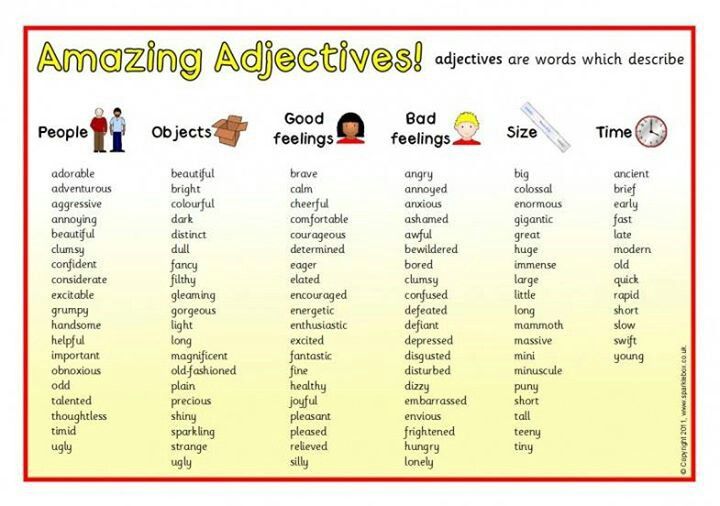 For example, when it is required to exclude people of choleric temperament from the candidates under consideration ... in this case, characterizing him as "melancholy" will do him good)
For example, when it is required to exclude people of choleric temperament from the candidates under consideration ... in this case, characterizing him as "melancholy" will do him good) - Powerful
- Fashion
- Moral
- Motivated
- Wise
- Wise
- Wisdom
- Musical
- Cweaty - Simple. Completely. Completely. description, sometimes - can serve as a negative feature)
- Thinking
- Soft (here in the meaning - soft in character, not to the touch)
- Soft -hearted
N
- Ertheated
- Reliable
- Nacked
- assertive
- Potter (in a good sense. assertiveness)
- Well-read
- Not indifferent
- Not indifferent
- Undemanding
- Unflappable
- NOT Military
- Infant (a useful property for ... for example - a surgeon and other specialists where a certain share of insensibility is required to fulfill their professional tasks)
- Nejadema
- Non -dry
- Negloor
- Non -Wire useful property for a man, for a woman - rather negative)
- Gentle
- Independent
- Disinterested (a useful feature when it is required to be disinterested in something in order to be objective)
- Principly
- Unfinous
- Large
- Extraordinary
- Non -sound
- Non -sound
- Non -melodious one, a produced and one -mights and in the same way.
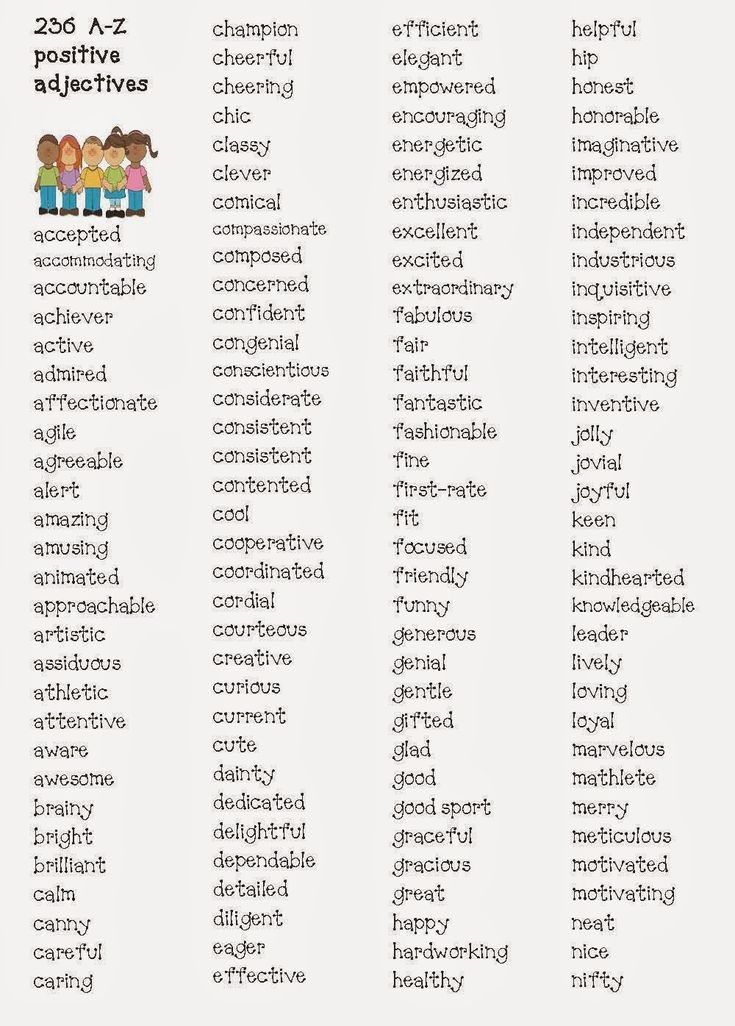 cockroaches")
cockroaches") - Innocent
- Uncorrupted
- Incorrigible
- Non-contentious
- Unselfish
- Unnecessary
- Unkind
- unemotional (it can positively characterize a person if the lack of emotionality, equanimity, excerpt, etc.)
- Normal
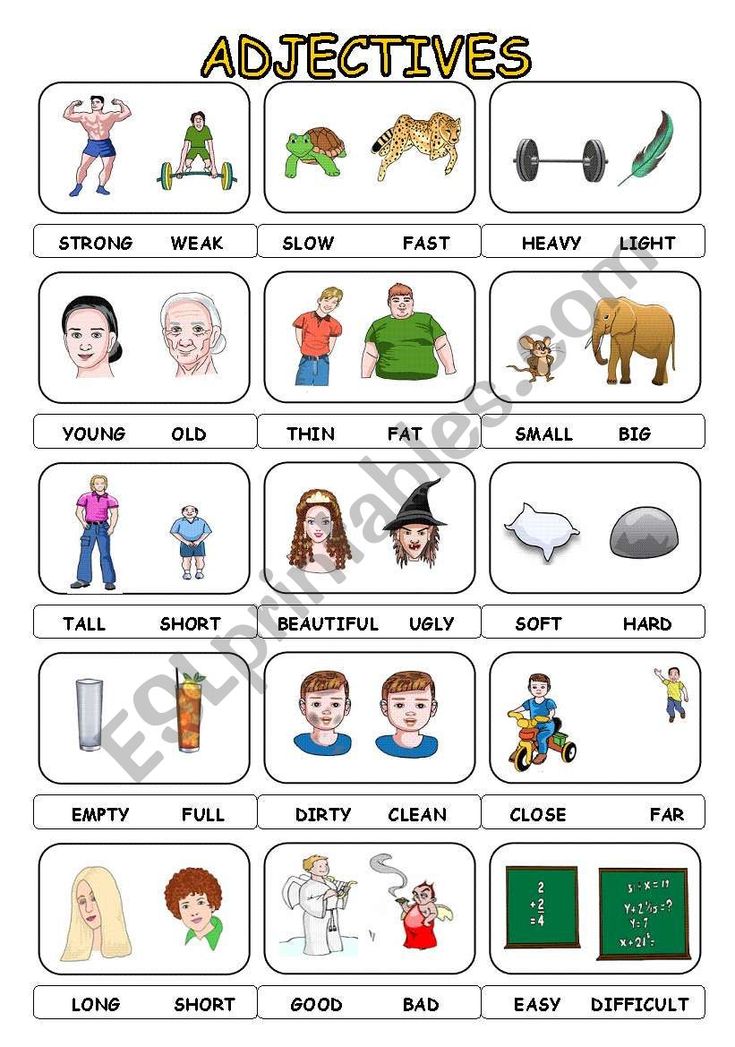 )
) С
- Original
- Self-sufficient
- Self-forgetful
- Strong (not necessarily physically strong, for example: a strong person, mentally strong, mentally strong, etc.) e.)
- Skeptical
- Modest
- Scrupulous
- Loquacious
- Complicated (for example, complexly organized, etc. this can be both a negative characteristic and a positive one.
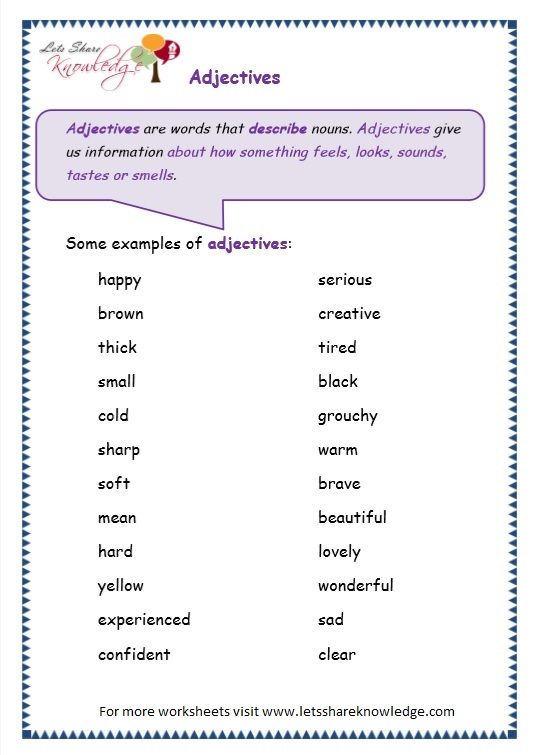 This word can be described from a good side only if attached to it positive coloring in the context)
This word can be described from a good side only if attached to it positive coloring in the context) - Stable (constant, durable, sensible, emotional-stabil, socially stable, etc.)
- Stepnoy
- Strongy
- Passionate
- Strong-resistant
- Happy Happy Happy
- Tactful
- Talented
- Solid (here it means a reliable, stubborn, courageous, inflexible person)
- Creative
- Lucky
- amazing
- Squeezing
- Smiling
- Skillful
- Moderate
- Pacified
- Smart
- Unique
- CAN TREED OF THE COMMUNITURED (WHOS CAN TREE OF THE CAN depends on the context and circumstances)
- Balanced
- Diligent
- Diligent
- Helpful
- Successful
- Blonding
- Sophisticated
- Frontier
- Scientist
- Calid
- Sustainable (for example: mentally, emotionally, professionally, etc.
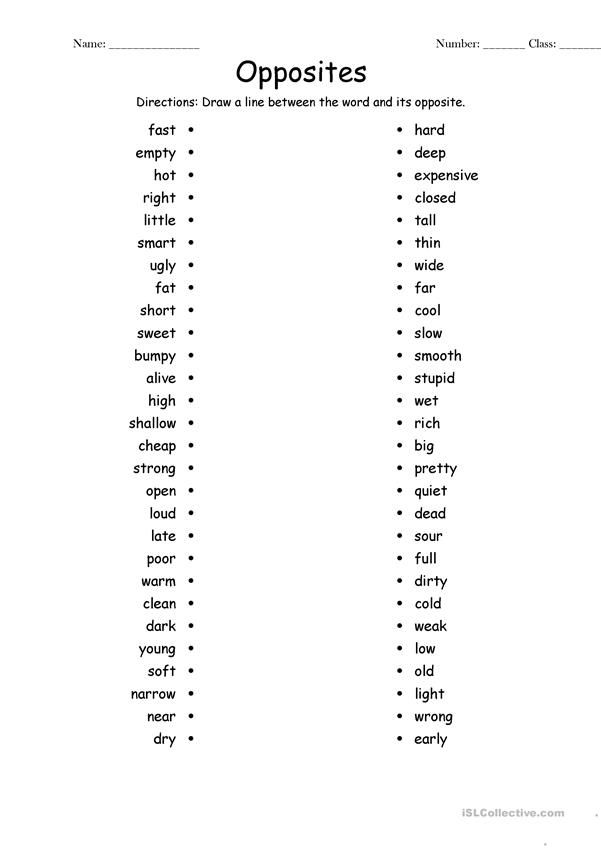 )
) - Fanatic (for example, fanatically brought to work, children, children, children etc.)
- Fantasizing
- Lucky (from the word "luck")
- Fatish (depending on the context - in some cases it serves as a positive, negative or neutral characteristic)
- Philosophical (for example: philosophically minded, philosophically reasoning, etc.)
- Phlegmatic (neutral characteristic, but phlegmatic can be considered a virtue when a person of exactly the phlegmatic type is required, and all other types are undesirable)
- Photogenic
- Fundamental (here in the meaning - strong, strong)
- Charismatic
- Cold-blooded
- Hospitable
- Economically competent (economically prepared)
- Expert
- Extravagant (sometimes this word can be positively characterized, sometimes - negatively. Depends on the context)
- Energetic
- Emotional
- Empathetic (capable of empathy)
- Extraordic
- Outrageous
- Elite
- Spectacular
- Humorous
- Homornaya
- Young
- Legally competent/illiterate
- Yurkiy
- Language
- Bright
- Yariy (On any inclinations , an ardent hater of fools)
- Furious (here, as above - a fierce fan of his profession, for example)
- Clairvoyant
- All of the above words can positively characterize both a man and a woman, a teenager and in many cases a child.
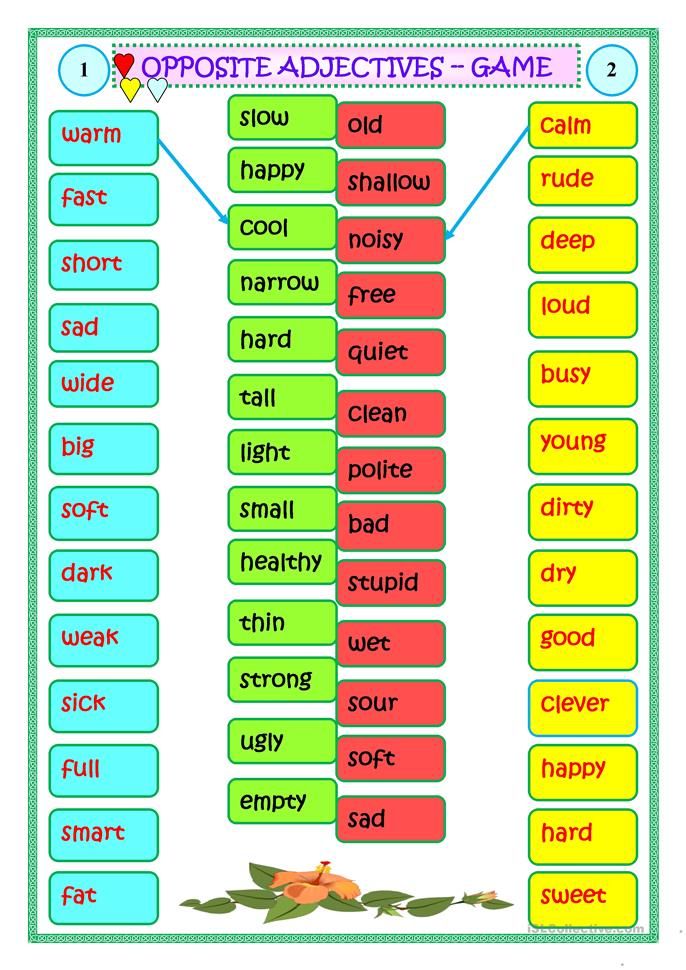 To do this, you need to change the ending of each word, changing the gender of the word from masculine to feminine.
To do this, you need to change the ending of each word, changing the gender of the word from masculine to feminine. - This list of words is useful when creating a profile, resume, self-presentation, cover letter (when looking for a job), essays and is applicable wherever it is required to describe a person (his character traits, behavioral characteristics, personality traits, etc.).
- The collection of words was collected manually by the author of the site. And the author has copyright. Use the list for personal non-commercial purposes and do not use it for reprinting and publication (in whole or in separate fragments) on any media (electronic, paper, etc.).
- The descriptive adjective is one of the three main types of adjectives.
- Descriptive adjectives or descriptive words give detailed information about a subject.
- Descriptive adjectives can help you understand what something looks like, how many it is, what size it is, or what it's made of.
- Homeschooling Myths
- What is School Dropout
- List of Adjectives
f
X
Yu
I
Note:
Similar items
Children's Descriptive Adjective List
Children's Descriptive Adjective List can help students understand this part of speech and improve their writing. Describing words for children should focus on adjectives that children have heard or words that are easy for them to pronounce and spell.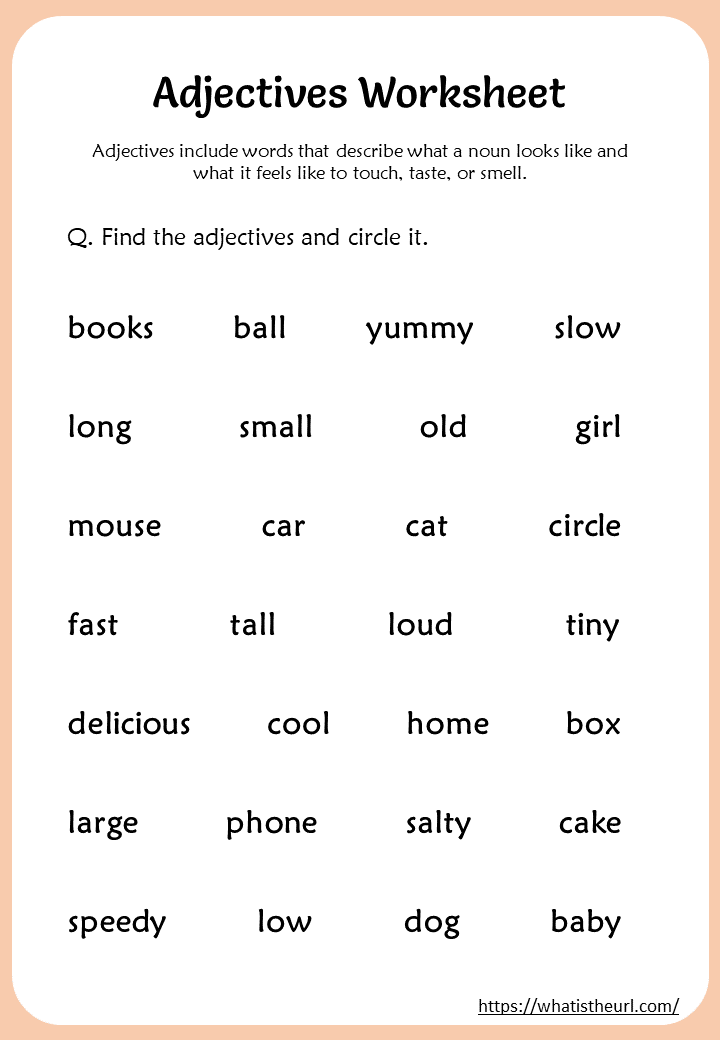
What are descriptive adjectives and words?
Words that describe people, places, and things, or nouns, are called adjectives. You can remember this by thinking, "the adjective adds something."
Examples of Descriptive Adjectives for Children
Having an extensive list of descriptive adjectives handy can help children improve their vocabulary. You can look at the list of adjectives to see how some describe the words and how others tell you different details about the noun.
dirty truth or dare questions for teenagers
Appearance adjectives
If you need an adjective to describe a child or adult, you can use words that describe in detail their appearance, size or age. Whenever possible, try to use positive words that describe the person.
| Looks | Size | Age |
|---|---|---|
| Zany |
Adjectives to describe emotions and feelings
Children have a lot of emotions and they often have very big feelings. Different emotion words can help you express exactly how you feel.

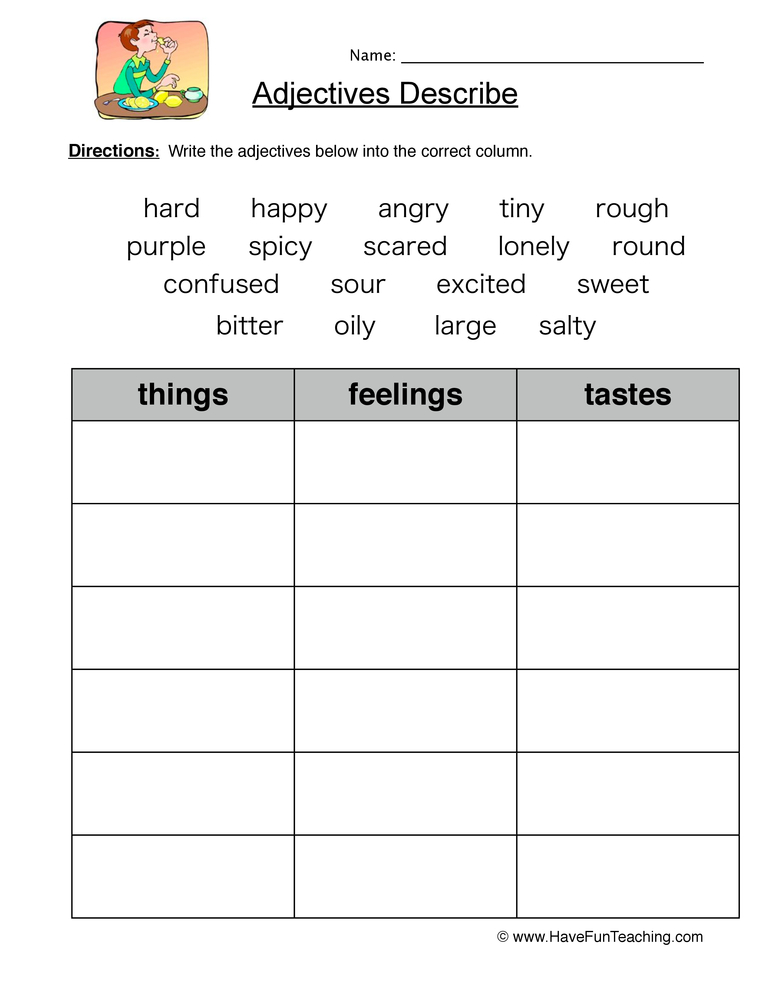 Look for creative ways to share adjective examples to make the most of these grammar lessons.
Look for creative ways to share adjective examples to make the most of these grammar lessons. 